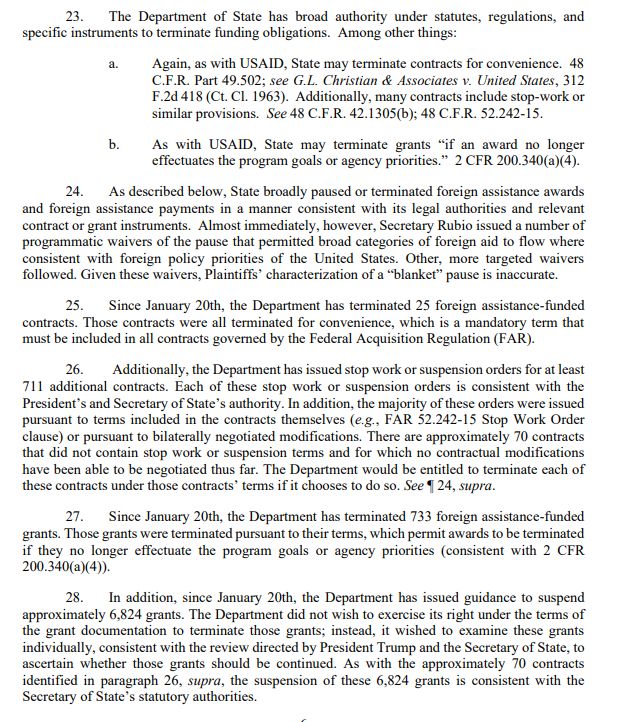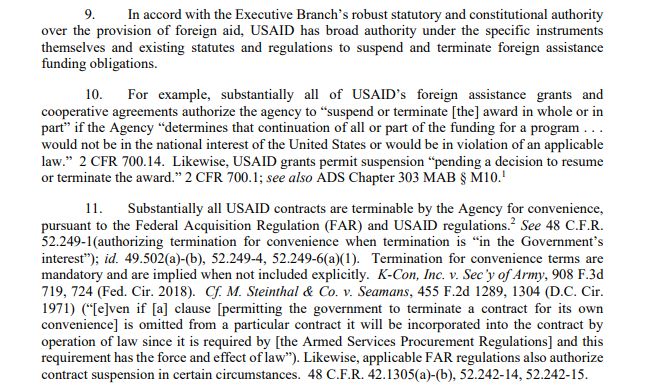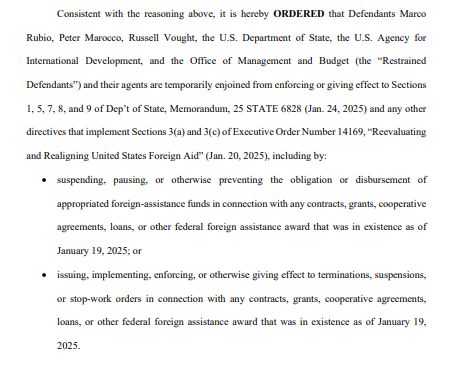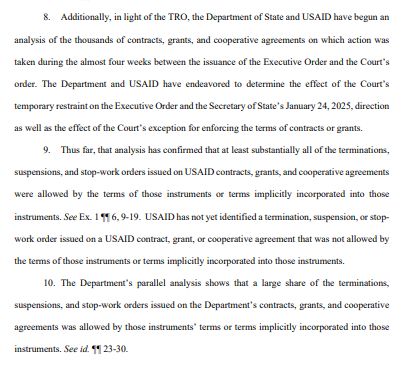Scott R. Anderson
@sranderson.bsky.social
General Counsel and Senior Editor at Lawfare. Fellow at the Brookings Institution and Columbia Law School. Former diplomat and lawyer.
As Sotomayor's concurrence makes clear, the 8-1 majority stayed the district court's preliminary injunction because it didn't enjoin any specific restructuring plans or RIFs, but any implementation of Trump's EO and a related OMB directive—both of which told agencies to act consistent with the law.

July 9, 2025 at 3:15 AM
As Sotomayor's concurrence makes clear, the 8-1 majority stayed the district court's preliminary injunction because it didn't enjoin any specific restructuring plans or RIFs, but any implementation of Trump's EO and a related OMB directive—both of which told agencies to act consistent with the law.
The new Pope’s last (re)Tweet speaks volumes.

May 8, 2025 at 5:40 PM
The new Pope’s last (re)Tweet speaks volumes.
Courts have taken diverse approaches to the exception, but rarely apply it as categorically as Rubio would (and never just because the Secretary said so).
For example, the 2d Cir. quite expressly interprets it narrowly—especially in re immigration.
scholar.google.com/scholar_case...
For example, the 2d Cir. quite expressly interprets it narrowly—especially in re immigration.
scholar.google.com/scholar_case...


March 13, 2025 at 9:08 PM
Courts have taken diverse approaches to the exception, but rarely apply it as categorically as Rubio would (and never just because the Secretary said so).
For example, the 2d Cir. quite expressly interprets it narrowly—especially in re immigration.
scholar.google.com/scholar_case...
For example, the 2d Cir. quite expressly interprets it narrowly—especially in re immigration.
scholar.google.com/scholar_case...
The APA is a statute that sets out an exception for the “foreign affairs function” to its usual procedural requirements for gov’t action.
The Secretary doesn’t authoritatively interpret that, courts will (and did even before Loper Bright).
www.law.cornell.edu/uscode/text/...
The Secretary doesn’t authoritatively interpret that, courts will (and did even before Loper Bright).
www.law.cornell.edu/uscode/text/...

March 13, 2025 at 9:08 PM
The APA is a statute that sets out an exception for the “foreign affairs function” to its usual procedural requirements for gov’t action.
The Secretary doesn’t authoritatively interpret that, courts will (and did even before Loper Bright).
www.law.cornell.edu/uscode/text/...
The Secretary doesn’t authoritatively interpret that, courts will (and did even before Loper Bright).
www.law.cornell.edu/uscode/text/...
Judge Ali—just hours after the USG brief—called the Trump admin out (politely) for brazenly not complying with the TRO and releasing frozen foreign assistance funds.
As predicted, he denied contempt, but directed the USG to do better on compliance.
storage.courtlistener.com/recap/gov.us...
As predicted, he denied contempt, but directed the USG to do better on compliance.
storage.courtlistener.com/recap/gov.us...

February 21, 2025 at 1:07 AM
Judge Ali—just hours after the USG brief—called the Trump admin out (politely) for brazenly not complying with the TRO and releasing frozen foreign assistance funds.
As predicted, he denied contempt, but directed the USG to do better on compliance.
storage.courtlistener.com/recap/gov.us...
As predicted, he denied contempt, but directed the USG to do better on compliance.
storage.courtlistener.com/recap/gov.us...
This is why the USG’s reply works hard to put those latter arguments front and center.

February 20, 2025 at 8:40 PM
This is why the USG’s reply works hard to put those latter arguments front and center.
Second, it emphasizes again the availability of alternative, case-specific remedies that could result in reimbursement in certain cases.

February 20, 2025 at 8:40 PM
Second, it emphasizes again the availability of alternative, case-specific remedies that could result in reimbursement in certain cases.
First, it tries to distract from its extraordinarily (and, in my view, inappropriately) broad reading of the TRO by shifting the burden to the plaintiffs and focusing on the basis for their specific claims.


February 20, 2025 at 8:40 PM
First, it tries to distract from its extraordinarily (and, in my view, inappropriately) broad reading of the TRO by shifting the burden to the plaintiffs and focusing on the basis for their specific claims.
The USG's more immediate strategy, however, appears to be to bully Judge Ali into confirming their narrow interpretation of the TRO by asking him to tee up an immediate appeal if he doesn't.
I hope he sticks to his guns and makes them comply with his original TRO as intended.
I hope he sticks to his guns and makes them comply with his original TRO as intended.

February 19, 2025 at 5:02 PM
The USG's more immediate strategy, however, appears to be to bully Judge Ali into confirming their narrow interpretation of the TRO by asking him to tee up an immediate appeal if he doesn't.
I hope he sticks to his guns and makes them comply with his original TRO as intended.
I hope he sticks to his guns and makes them comply with his original TRO as intended.
The real long-term strategy, though, gives itself away in Marocco's discussion of alternative remedies.
The USG wants to cast this as a bunch of contract disputes properly addressed through alternate procedures that may eventually yield damages—not as a unified policy subject to review as such.
The USG wants to cast this as a bunch of contract disputes properly addressed through alternate procedures that may eventually yield damages—not as a unified policy subject to review as such.


February 19, 2025 at 5:02 PM
The real long-term strategy, though, gives itself away in Marocco's discussion of alternative remedies.
The USG wants to cast this as a bunch of contract disputes properly addressed through alternate procedures that may eventually yield damages—not as a unified policy subject to review as such.
The USG wants to cast this as a bunch of contract disputes properly addressed through alternate procedures that may eventually yield damages—not as a unified policy subject to review as such.
The declaration from F acting director Peter Marocco points to the type of authorities they are relying on.
Notable in my mind that these legal arguments are coming in his declaration, not in DOJ's brief. A little odd.
www.courtlistener.com/docket/69627...
Notable in my mind that these legal arguments are coming in his declaration, not in DOJ's brief. A little odd.
www.courtlistener.com/docket/69627...


February 19, 2025 at 5:02 PM
The declaration from F acting director Peter Marocco points to the type of authorities they are relying on.
Notable in my mind that these legal arguments are coming in his declaration, not in DOJ's brief. A little odd.
www.courtlistener.com/docket/69627...
Notable in my mind that these legal arguments are coming in his declaration, not in DOJ's brief. A little odd.
www.courtlistener.com/docket/69627...
The court's discussion of other contract terms in the TRO is clearly meant to permit actions "to enforce the terms of particular contracts...."
Reading that as allowing the USG to continue to exercise any contract rights, including those contrary to the TRO's directives, is absurd.
Reading that as allowing the USG to continue to exercise any contract rights, including those contrary to the TRO's directives, is absurd.

February 19, 2025 at 5:02 PM
The court's discussion of other contract terms in the TRO is clearly meant to permit actions "to enforce the terms of particular contracts...."
Reading that as allowing the USG to continue to exercise any contract rights, including those contrary to the TRO's directives, is absurd.
Reading that as allowing the USG to continue to exercise any contract rights, including those contrary to the TRO's directives, is absurd.
This is an incredibly bad faith way to read the court's TRO, which expressly bars USAID and State from implementing the EO.
Of course the TRO doesn't enjoin reliance on the EO and cable as the USG argues, as EOs and cables don't give any authority. Agencies use other authorities to implement them.
Of course the TRO doesn't enjoin reliance on the EO and cable as the USG argues, as EOs and cables don't give any authority. Agencies use other authorities to implement them.

February 19, 2025 at 5:02 PM
This is an incredibly bad faith way to read the court's TRO, which expressly bars USAID and State from implementing the EO.
Of course the TRO doesn't enjoin reliance on the EO and cable as the USG argues, as EOs and cables don't give any authority. Agencies use other authorities to implement them.
Of course the TRO doesn't enjoin reliance on the EO and cable as the USG argues, as EOs and cables don't give any authority. Agencies use other authorities to implement them.
It does note certain activities have been halted instead of terminated, but flags that this may not be permissible under the TRO unless it permits the USG to exercise statutory and regulatory authorities.
So it asks the court to clarify the TRO to permit this, or threatens to terminate them.
So it asks the court to clarify the TRO to permit this, or threatens to terminate them.


February 19, 2025 at 5:02 PM
It does note certain activities have been halted instead of terminated, but flags that this may not be permissible under the TRO unless it permits the USG to exercise statutory and regulatory authorities.
So it asks the court to clarify the TRO to permit this, or threatens to terminate them.
So it asks the court to clarify the TRO to permit this, or threatens to terminate them.
The USG is arguing that the TRO doesn't bar it from exercising contract terms that allow it to halt or terminate work.
And that nothing it's done so far to implement the President's assistance freeze EO has been contrary to those contracts, so none is affected by the TRO.
And that nothing it's done so far to implement the President's assistance freeze EO has been contrary to those contracts, so none is affected by the TRO.


February 19, 2025 at 5:02 PM
The USG is arguing that the TRO doesn't bar it from exercising contract terms that allow it to halt or terminate work.
And that nothing it's done so far to implement the President's assistance freeze EO has been contrary to those contracts, so none is affected by the TRO.
And that nothing it's done so far to implement the President's assistance freeze EO has been contrary to those contracts, so none is affected by the TRO.
But that regulation really stretches to get around the 10 day statutory limit Congress imposed in 2016, in a way I think is pretty clearly inconsistent with the (not particularly ambiguous!) statute.
Just read the FedRed implementing notice compare to the statute.
www.govinfo.gov/content/pkg/...
Just read the FedRed implementing notice compare to the statute.
www.govinfo.gov/content/pkg/...



February 5, 2025 at 2:25 PM
But that regulation really stretches to get around the 10 day statutory limit Congress imposed in 2016, in a way I think is pretty clearly inconsistent with the (not particularly ambiguous!) statute.
Just read the FedRed implementing notice compare to the statute.
www.govinfo.gov/content/pkg/...
Just read the FedRed implementing notice compare to the statute.
www.govinfo.gov/content/pkg/...
A bit more info on this…
This argument—and presumably the Trump admin’s broader use of admin leave to shit down agencies—leans heavily on this CFR regulation.
www.ecfr.gov/current/titl...
This argument—and presumably the Trump admin’s broader use of admin leave to shit down agencies—leans heavily on this CFR regulation.
www.ecfr.gov/current/titl...

February 5, 2025 at 2:25 PM
A bit more info on this…
This argument—and presumably the Trump admin’s broader use of admin leave to shit down agencies—leans heavily on this CFR regulation.
www.ecfr.gov/current/titl...
This argument—and presumably the Trump admin’s broader use of admin leave to shit down agencies—leans heavily on this CFR regulation.
www.ecfr.gov/current/titl...
Today’s new OPM memo provides a partial answer in the context of the “buy out”.
Not sure I find this analysis and interpretation entirely persuasive though…
chcoc.gov/sites/defaul...
Not sure I find this analysis and interpretation entirely persuasive though…
chcoc.gov/sites/defaul...

February 4, 2025 at 6:57 PM
Today’s new OPM memo provides a partial answer in the context of the “buy out”.
Not sure I find this analysis and interpretation entirely persuasive though…
chcoc.gov/sites/defaul...
Not sure I find this analysis and interpretation entirely persuasive though…
chcoc.gov/sites/defaul...
Congress has mandated USAID’s existence in statute for decades, and appropriated funds for it accordingly.
Folding it into the State Department by executive action is flat out contrary to federal law—and probably unlawful, unless you buy into an unprecedentedly broad view of executive authority.
Folding it into the State Department by executive action is flat out contrary to federal law—and probably unlawful, unless you buy into an unprecedentedly broad view of executive authority.

February 1, 2025 at 10:06 PM
Congress has mandated USAID’s existence in statute for decades, and appropriated funds for it accordingly.
Folding it into the State Department by executive action is flat out contrary to federal law—and probably unlawful, unless you buy into an unprecedentedly broad view of executive authority.
Folding it into the State Department by executive action is flat out contrary to federal law—and probably unlawful, unless you buy into an unprecedentedly broad view of executive authority.


